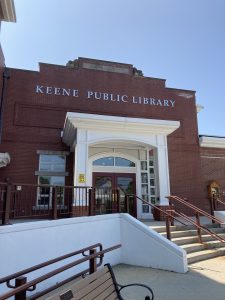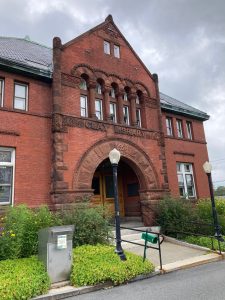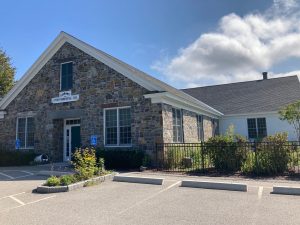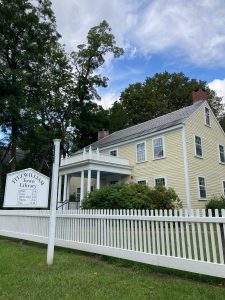Nov
09

Posted by Margot M on November 9th, 2023
Posted in: Blog
Tags: academic libraries, Focused Outreach, New Hampshire, public libraries
This summer, I drove up to southern New Hampshire to visit public and academic libraries. Region 7 is conducting Focused Outreach to Cheshire and Sullivan Counties, NH and Litchfield County, CT. My colleagues Sarah Levin-Lederer and Bennie Finch made separate trips. For my Cheshire County visits, I identified libraries by looking at the NNLM Membership Directory. I reached out to contacts made at the New Hampshire Library Association meeting. I went on a LinkedIn search to track down a librarian friend to make an introduction for me.

Keene Public Library
My first trip was to Keene. I met with Marti Fiske at Keene Public Library and Celia Rabinowitz at Keene State College. These town-and-gown libraries are great collaborators. Mason Library at Keene State shares an online catalog with Keene Public Library. Cardholders can borrow physical items from either library.
At the Keene Public Library, Marti noted that true reference questions have dropped in the last 5-10 years. Patrons come into the library with an idea of what they want. They are not asking for advice on where to look for information. Reference librarians attempt to guide patrons to reputable sources. Social services agencies schedule office hours at the library. Several of these organizations assist with health and mental health issues.
Keene State College is on Main Street and very accessible to the public. People come into the Mason Library to use computers and to read print newspapers. DVDs are available for loan—cost of streaming services is prohibitive for many. Celia spoke about the increased neurodiversity of college students. People with autism are a newer population that the library serves.

Jaffrey Public Library
Several weeks later, I drove up to Jaffrey Public Library to meet with Julie Perrin. Julie believes that many people google for health information. If patrons ask for health information, they prefer books. She gently guides them toward reputable internet resources. Fewer patrons are using the library computers, but they do use the Wi-Fi for their own devices—both inside and outside the library.
Julie interfiles health information with the book collection. Brochures and information packets (including NLM resources) are located in the women’s health section. Information on veterans health is available in the military history book collection because Julie noted that veterans like to read military history.

Chesterfield Public Library
At the end of the summer, I visited Chesterfield Public Library and Fitzwilliam Town Library. Clai Lasher-Sommers told me that patrons in Chesterfield still want books for health information. She did heavy weeding when she arrived as director nearly one year ago. She would like to build a special section for reliable health information. She would like to host talks on tickborne illnesses, mobility issues, dementia, and support for caregivers.

Fitzwilliam Town Library
Kate Thomas in Fitzwilliam is a proponent weeding the collection as well. She would appreciate guidance on purchasing health information books, especially for specialized diets—gluten-free, Mediterranean, FODMAP.
Kate assumes that people google for health information. She has health resources on the library’s website (EBSCO Health Source and MedlinePlus), but she says that they do not get any hits. The library does lots of programming, sometimes three programs in one day! There is no senior center or recreation center in town.
Region 7 hopes to provide online training on MedlinePlus for the Nubanusit Library Association in 2024. This organization serves some of the smallest libraries in New Hampshire. We will demonstrate resources that address the pressing health information needs of southern New Hampshire.